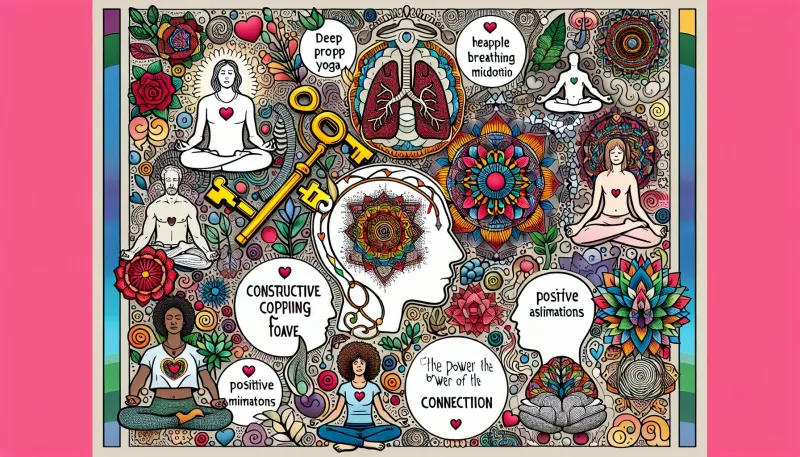Unlocking the Power of the Mind-Body Connection and Effective Coping Mechanisms

Explore the mind-body connection and discover effective coping mechanisms to improve mental and physical well-being.
The intricate relationship between the mind and the body has been a subject of profound interest and research for centuries. In recent years, science has provided substantial evidence supporting the significance of this connection in enhancing overall well-being. Equally, understanding and employing effective coping mechanisms can drastically improve how individuals deal with life's stressors. This article delves into the essence of the mind-body connection and shares practical coping strategies to nurture both mental and physical health.
Understanding the Mind-Body Connection
The Science Behind the Mind-Body Connection
The concept of the mind-body connection is based on the understanding that our thoughts, feelings, beliefs, and attitudes can positively or negatively affect our biological functioning. Essentially, our mind and body are intricately dependent on each other. According to research from the American Psychological Association, psychological stress can affect physiological responses and, inversely, physical health can impact mental well-being.
The Role of the Nervous and Endocrine Systems
The nervous and endocrine systems play crucial roles in the mind-body connection. The brain, particularly the hypothalamus, regulates the autonomic nervous system, which controls bodily functions such as heart rate, digestion, and respiratory rate. Concurrently, the endocrine system releases hormones that influence our mood and stress levels. The bidirectional communication between the brain and the body via these systems exemplifies the mind-body connection.
Effective Coping Mechanisms
Cognitive Behavioral Techniques
Cognitive Behavioral Therapy (CBT) is a widely utilized approach that helps individuals change destructive thought patterns. By addressing and restructuring these patterns, CBT aids in reducing stress and improving mental resilience. Techniques like cognitive restructuring, which involves identifying and challenging ingrained negative thoughts, are pivotal for mental well-being.
Mindfulness and Meditation
Mindfulness is the practice of maintaining awareness of our thoughts, feelings, bodily sensations, and surroundings in the present moment. Numerous studies have shown that mindfulness and meditation can significantly reduce stress, improve focus, and enhance emotional regulation. Regular practice can lead to a profound sense of calm and clarity.
Physical Exercise
Physical exercise is not only beneficial for the body but also for the mind. Regular physical activity has been shown to reduce symptoms of anxiety and depression. Exercise promotes the release of endorphins, which act as natural mood lifters, and helps in reducing stress hormones like cortisol. Incorporating regular exercise into one’s routine can substantially enhance overall well-being.
Healthy Nutrition
A balanced diet plays a significant role in the mind-body connection. Nutrients such as omega-3 fatty acids, antioxidants, and vitamins are essential for brain health. Consuming a diet rich in fruits, vegetables, whole grains, and lean proteins can boost mental clarity, energy levels, and emotional stability.
Social Support and Connection
Maintaining strong social connections and a support network can act as a buffer against stress. Interactions with family and friends provide emotional support and a sense of belonging, which are critical for mental health. Engaging in community activities or support groups can foster social bonds and provide practical stress-relief benefits.
Professional Help
At times, despite our best efforts, stress and mental health challenges may require professional intervention. Seeking help from a mental health professional can provide tailored strategies and therapeutic techniques to cope effectively. Treatments such as psychotherapy, counseling, and medication, if necessary, can be pivotal in managing mental health.
Implementing Coping Mechanisms in Daily Life
Integrating these coping mechanisms into daily life requires a strategic and personalized approach. Here are some steps to help incorporate these strategies effectively:
Create a Routine
Establish a consistent daily routine that includes time for mindfulness, exercise, and social interactions. Consistency helps in habitualizing these positive practices and makes it easier to stick to them in the long run.
Set Realistic Goals
Setting small, attainable goals can prevent overwhelm and build a sense of accomplishment. Whether it’s a 10-minute meditation session or a short walk, these small steps contribute significantly to overall well-being.
Seek Balance
A balanced approach that includes work, leisure, physical activity, and relaxation is vital for sustaining mental and physical health. Ensure to include breaks and recreational activities that you enjoy to prevent burnout.
Monitor Progress
Regularly assess the effectiveness of the coping mechanisms you employ. Keeping a journal or using apps to track mood, exercise, and mindfulness practice can help monitor progress and make necessary adjustments.
Conclusion
The mind-body connection underscores how deeply intertwined our mental and physical states are. By understanding this connection and utilizing effective coping mechanisms, individuals can enhance their overall health and resilience. As we continue to explore and embrace these strategies, we pave the way for a balanced, fulfilling life. Remember that seeking professional help is a crucial step when self-management techniques are not sufficient. Nurturing the mind and body is a gradual, ongoing journey that requires patience, commitment, and self-compassion.



























